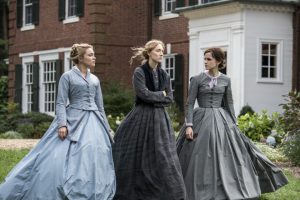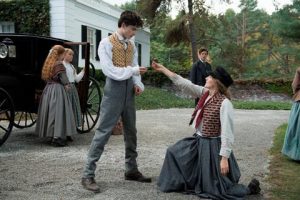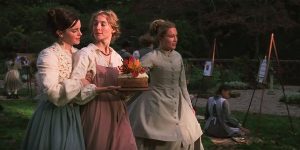Director Francis Lee managed to make the lives of English sheep-herders look downright sensual in God’s Own Country, so it’s somehow no surprise that his next feature film project, Ammonite, stars two 19th Century English paleontologists passionately courting each other in between long walks on the windswept beaches of Lyme Regis, searching for fossil fragments. Despite how seemingly bizarre the concept might be, it’s the chemistry between Kate Winslet and Saoirse Ronan (moving from one period piece, Little Women, to another) that is going to carry this film to what could easily be a slew of Oscar nominations.
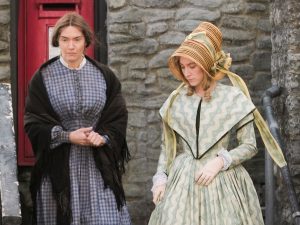
Winslet plays an actual historical figure, English paleontologist Mary Anning, one of the most remarkable women working in science during her era: though she made numerous important discoveries during her lifetime, she was undermined at every turn by men who took her work and gave her little to no credit, and she suffered from financial difficulties until her death in 1847. To make ends meet, she opened a fossil and seashell shop for tourists – but the fossil-hunting business was surprisingly risky (she was nearly killed during a landslide on one occasion). Her hard work and perseverance eventually won her the respect she deserved after her passing. Ammonite follows her during her bleak later years. Ronan, meanwhile, plays Mary Anning’s younger apprentice, the real-life Charlotte Murchison, who suffers from “melancholia” and hates the sea, at least initially. The two women couldn’t be more different, but eventually find themselves falling deeply, hopelessly in love with the other. There is no concrete evidence that Anning and Murchison were lovers in actuality, or that either was a lesbian, as Ammonite suggests, but when the topic came up last year (after one of Anning’s distant relatives expressed her displeasure with the idea), Francis Lee wrote that: “After seeing queer history be routinely “straightened” throughout culture, and given a historical figure where there is no evidence whatsoever of a heterosexual relationship, is it not permissible to view that person within another context?”. Lee is correct that Anning never married, and is not known to have had any relationships with men, whereas her close and long-lasting bonds with the women in her life are well-documented.
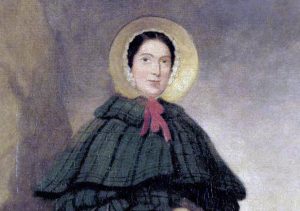
Whether Anning and Murchison were or were not lesbians and/or in love, Ammonite still looks like an excellently made film with a clearer vision and a tighter, more well-written story than God’s Own Country: and it’s sure to be a big hit amongst fans of the “cottagecore” aesthetic. For those unaware, “cottagecore” refers to the escapist fantasy of living harmoniously with nature by enjoying a simple life that can include past-times such as baking, gardening, knitting, and, yes, living in tiny cottages, and it is particularly popular with LGBTQ+ folks, especially lesbians and queer women. If there’s a “maritime cottagecore” subgenre of the aesthetic, then Ammonite conveys it perfectly: brisk walks along the beach; houses perched on cliffsides; lots and lots of fossils and shells (interestingly, although it’s never been confirmed, Mary Anning is sometimes said to be the inspiration for the “She Sells Seashells” nursery rhyme; just something to keep in mind); and, just as importantly, a lesbian romance. Those interested in learning more about “cottagecore” and its prominence in LGBTQ+ culture should definitely check out Rowan Ellis’ deep-dive into the aesthetic’s origins and meanings.

Basically, it’s a good time to be alive if you’re a fan of “cottagecore”, LGBTQ+ friendly content, historical fiction, romance, women in science, paleontology, geology, Kate Winslet or Saoirse Ronan (who isn’t a fan of Saoirse Ronan at this point?). Somehow all of those elements work together very nicely, and I’m excited to see if Francis Lee has progressed enough as a director (I really didn’t like God’s Own Country) that he can make this understated romance pop onscreen and attract all the media attention it will need to start a strong Oscars campaign. Portrait Of A Lady On Fire, a French film from last year which followed a very similar concept (two women meet on a beautiful coastline and fall in love while bonding over art) was a fan-favorite but failed to score even a single nomination from the Academy. Ammonite, luckily, has Winslet (an Oscar winner and six-time nominee) and Ronan (a four-time nominee) as its secret weapons. Fingers crossed that their fossil-hunting expedition proves fortuitous for everyone involved!
Trailer Rating: 9/10

